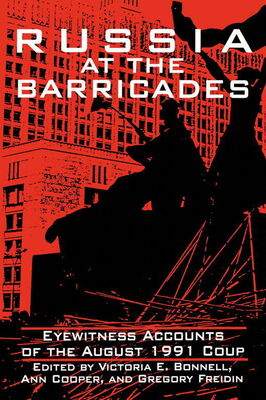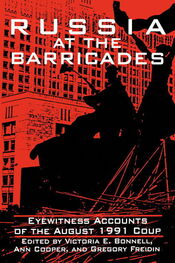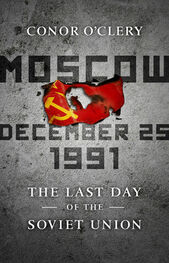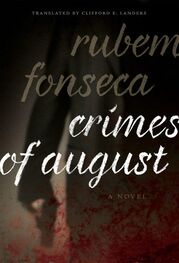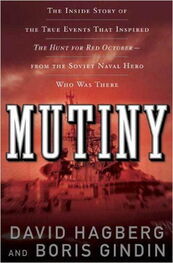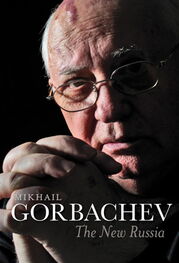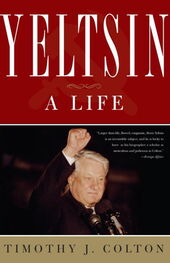In the confrontation of September–October 1993, Yeltsin did not hesitate to cut off all White House communications, as well as water and electricity.
On “Vremia,” see the account of Sergei Medvedev’s film report, above, and the interview with Medvedev in part V. For an analysis of television’s role in defeating the coup, see Bonnell and Freidin, “ Televorot .” The government newspaper Izvestiia also eluded control by the putschists. Due to internal conflicts on the paper’s staff, no issue of Izvestiia appeared on August 19. The issue published on the morning of August 20 carried statements from the Emergency Committee on page one and Yeltsin’s “Appeal to the Citizens of Russia” on page two. The afternoon edition on August 20 had two photographs which showed a vast crowd carrying the Russian tricolor flag at the Moscow rally and civilians fraternizing with soldiers in tanks. Again, Yeltsin learned his lesson well. After issuing his decree disbanding the Russian parliament in September 1993, he took firm control of news programming on Russian television and briefly invoked press censorship in the wake of the October military confrontation.
Two other notable figures associated with the plotters (Marshal of the Soviet Union Sergei Akhromeev, and Nikolai Kruchina, Chief of the CPSU Central Committee’s Administrative Office) committed suicide soon afterward.
The interview with Karpukhin appeared in Literaturnaia gazeta under the title “Oni otkazalis shturmovat Belyi dom,” August 28, 1991, p. 5. An English translation may be found in Russian Politics and Law: A Journal of Translations , vol. 31, no. 1 (Summer 1992), pp. 8–11.
See the interview with Major General Aleksandr Korsak, “Nam byl otdan prikaz arestovat Popova,” in Literaturnaia gazeta , September 11, 1991. An English translation appears in Russian Politics and Law: A Journal of Translations , vol. 31, no. 1 (Summer 1992), pp. 16–20.
Lieutenant colonels Mikhail Golovatov and Sergei Goncharov of the Alpha unit made these statements in the interview with Literaturnaia gazeta cited in note 24.
According to the account by the head of the investigative team, the Russian Federation’s Prosecutor General Valentin Stepankov and his deputy, Yevgenii Lisov, the plans for the attack on the White House and the decision to proceed were made in the middle of the day on August 20. The attack itself was to commence at 3:00 A.M. on the 21st and was to be carried out by a combined force of the Airborne Paratroopers, the Special Forces of the Ministry of Internal Affairs, and three special units of the KGB—“Alpha,” “Group B,” and the “Wave.” However, commanders of the operation soon began to develop doubts about its wisdom, partly under the pressure of the lower ranks; partly for fear of losing up to half of their force (according to one estimate) in storming what had already become a well-fortified and well-defended building; and partly from the conviction that it would be wrong to spill their compatriots’ blood. According to the plan, code-named “Operation Thunder,” the paratroopers were to be the first to take up their position. Their commander, Pavel Grachev, refused to order them to advance. After talking to Grachev, Viktor Karpukhin, the commander of the “Alpha” unit and the man in charge of “Operation Thunder,” followed Grachev’s example, as did most other commanders. When in the early hours of the morning Yazov was informed about the first instance of bloodshed and the possibility of thousands of victims if an attack were to take place, his order was to “halt” the entire operation. See Stepankov and Lisov, Kremlevsldi zagovor .
Felicity Barringer, “Chronicle of the Resistance: 48 Tense Hours in Leningrad,” New York Times , September 10, 1991, p. A4.
The others were: Anatolii Lukianov, Chairman of the USSR Supreme Soviet; Oleg Shenin, Secretary of the CPSU Central Committee; Valentin Varennikov, Commander-in-Chief of Ground Forces and Deputy Minister of Defense; Yurii Plekhanov, Director of the Security Directorate of the KGB; and Viacheslav Generalov, Director of the KGB’s Specialized Operational-Technical Administration.
We have cited the book several times in this account (Stepankov and Lisov, Kremlevskii zagovor ). To date, it is available only in Russian.
See Steven Erlanger, “Russia Suspends Coup Trial, Citing Bias by the Prosecutor,” New York Times , May 19, 1993, p. A6.
See the issues of Radio Free Europe/Radio Liberty Daily Report for January 27, April 15–16, May 18–19, May 27, and July 7, 1993.
“Growing Minority in Russia Wish ’91 Coup Hadn’t Failed” (Associated Press), San Francisco Chronicle , August 19, 1993, p. A13.
Foreign Broadcast Information Service, Daily Report: Central Eurasia , FBIS-SOV–92–162, August 20, 1992, p. 17.
Popov’s remarks appeared in Izvestiia on August 21, 24, 25, 26, 1992. For an English translation see Current Digest of the Post-Soviet Press , vol. 44, no. 34 (September 23, 1992), pp. 1–6.
Accounts of the coup and its aftermath may be found in the following English-language sources: James H. Billington, Russia Transformed: Breakthrough to Hope, Moscow, August 1991 (New York, 1992); Victoria E. Bonnell and Gregory Freidin, “ Televorof . The Role of Television Coverage in Russia’s August 1991 Coup,” Slavic Review , vol. 52, no. 4 (Winter 1993); George W. Breslauer, “Bursting the Dams: Politics and Society in the USSR Since the Coup,” Problems of Communism , November/December 1991; John B. Dunlop, The Rise of Russia and the Fall of the Soviet Empire (Princeton, 1993); Mikhail Gorbachev, The August Coup: The Truth and the Lessons (New York, 1991); Amy Knight, “The Coup That Never Was: Gorbachev and the Forces of Reaction,” Problems of Communism , November/December 1991; Michael Mandelbaum, “Coup de Grace: The End of the Soviet Union,” Foreign Affairs , vol. 71, no. 1 (1991/2); William E. Odom, “Alternative Perspectives on the August Coup,” Problems of Communism , November/December 1991; Lilia Shevtsova, “The August Coup and the Soviet Collapse,” Survival , vol. 34, no. 1 (Spring 1992); Anatole Shub, “The Fourth Russian Revolution: Historical Perspectives,” Problems of Communism , November/December 1991; Hedrick Smith, The New Russians , Part Seven: The Second Russian Revolution (New York, 1991); Melor Sturua, “The Real Coup,” Foreign Policy , no. 85 (Winter 1991—2); and David Remnick, Lenin’s Tomb: The Last Days of the Soviet Empire (New York, 1993).
Russian-language sources on the coup are as follows: Avgust–91 (Moscow, 1991); … Deviatnadtsatoe, dvadtsatoe, dvadtsat pervoe…: svobodnoe radio dlia svobodnykh liudei (Moscow, 1991); Leonid Jvashov, Marshal Iazov: Rokovoi avgust 19-go (Moscow: Muzhestvo, 1992); Krasnoe ili beloe? Drama Avgusta–91: Fakty, gipotezy, stolknovenie mnenii (Moscow, 1991); Korichnevyi putch krasnykh avgust ’91: Khronika, svidetelstva pressy, fotodokumenty (Moscow, 1991); Iu. Kazarin and Boris Iakovlev, eds., Smert zagovora: Belaia kniga (Moscow, 1992); Khronika putcha: chas za chasom. Sobytiia 19–22 avgusta 1991 v svodkakh Rossiiskogo informatsionnogo agentstva (Leningrad, n.d.); Valentin Pavlov, Gorbachev-Putch: Avgust iznutri (Moscow, 1993); Putch: Khronika trevozhnykh dnei (Moscow, 1991); Iu.S. Sidorenko, Tri dnia, kotorye oprokinuli bolshevizm: Ispoved svidetelia, pokazaniia ochevodsta (Rostov-on-Don, 1991); V. Stepankov and E. Lisov, Kremlevskii zagovor: versiia sledstviia (Moscow, 1992).
Читать дальше